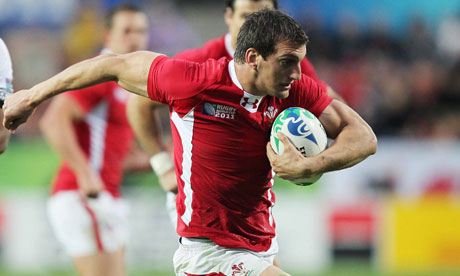
You might think that Warren Gatland had spent the past four years pondering the lines of a man who rose from the rank of cub reporter on the South Wales Daily Post to become his nation's most beloved poet: "The force that through the green fuse drives the flower / Drives my green age." Youth has come to Welsh rugby, and with it a sense of renewal and the blossoming of an optimism that may for once turn out to be justified, whatever the outcome of their adventure in New Zealand.
The Welsh squad members who attended Thursday's pre-match press conference were taken aback by the size of the attendance, which filled the appointed premises to bursting point, and by the intensity of the interest. They shook their heads with amazement when told the ever-escalating number of those back home who had booked tickets to watch the big screens in the Millennium Stadium: 40,000, 50,000, then 60,000, still a day and a half before the kick-off.
When it comes to rugby, Wales has trouble keeping success in proportion. The emotion pours out in a generous, unstoppable flood, swamping the senses. Gatland's team did wonderfully well to reach the semi‑final, outperforming the expectations of the outside world, if not their own, by at least equalling the achievement of their predecessors at the first Rugby World Cup in 1987. The qualities of modesty and freshness with which they have gone about making progress through the tournament were thrown into even higher relief by the failures of the dull, spoilt, oafish representatives of England. But these wearers of the Prince of Wales's fleur-de-lys still have some way to go before they can be considered the equals of the best of those who went before.
What would have happened had the World Cup been invented 20 years earlier? As like as not, the Wales of Barry John, Gareth Edwards, Mervyn Davies, Delme Thomas, JPR Williams and Gerald Davies, the grand slam winners of 1971 and the core of the British Lions team that returned victorious from New Zealand that summer, would have affirmed their quality, particularly if – as was never destined to happen – they had been coached by the great Carwyn James, the presiding spirit of that Lions tour.
The story of British rugby in the 1970s was the story of Wales in the old Five Nations tournament: three grand slams, one triple crown, one more championship. That is some standard for Sam Warburton and his young men to measure themselves by, even against the background of grand slams under Mike Ruddock in 2005 and Gatland three years later.
Overconfidence has been Wales's besetting sin. If it took a while for the rampant triumphalism of the 70s to sour, more recent flirtations with success have been quicker to curdle. Nothing is more salutary than the tale of the World Cup semi-finalists of 1987 – a team boasting players of the quality of Robert Jones, Jonathan Davies and Ieuan Evans, coached by Tony Gray – who went on to a triple crown the following year, persuading their fans to believe that the good times had never really gone away.
They returned to New Zealand in the summer of 1988 as joint champions of Europe, only to experience a rude awakening. Defeated in their opening games by Waikato (with Gatland in the front row) and then by Wellington, they managed to beat Otago before crashing to a 52-3 defeat at the hands of the All Blacks in the first Test in Christchurch. A win over Hawke's Bay, a draw with Taranaki and a loss to North Auckland presaged another shattering reverse at Eden Park in the second Test, this time by 54-9. Amid apocalyptic recriminations on their return home, the England-born Gray was sacked while Jonathan Davies and others accepted offers from rugby league clubs.
Every piece of evidence gathered in New Zealand suggests that the Warburton generation know the dangers and therefore have a chance of keeping their feet on the ground. Green in years but not, it seems, in judgment, they look – with the promise of four more years under Gatland – to be in it for the long haul.

